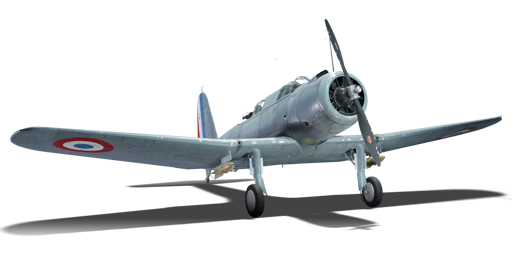



The SB2U-2 was developed in the early 1930s and was sold to the French as the V-156-F in February 1939. Some minor changes were made during reassembly in France, including French radios and 7.5 mm machine guns, and the installation of dive brakes which had originally been rejected during American testing. These aircraft were deployed on the French aircraft carrier Béarn; however, at the outbreak of the war, the carrier was deemed too slow for service, and both squadrons of V-156-F aircraft were transferred to land-based duty. The V-156-F was used continually until the French Armistice.
Introduced in Update 1.75 "La Résistance", the V-156-F is a fairly slow but sturdy aircraft. Built as a dive-bomber, it excels at diving down above a target to release its bombs. The V-156-F is one of the few early aircraft in War Thunder which features dive brakes (key-bound to 'H' by default) to aid in slowing down during a dive, thereby helping prevent the ripping off of the wings in RB and SB. The V-156-F differs from its American siblings (SB2U-2/-3) in that it has additional air brakes mounted on the upper and lower surfaces of the wings which extend 90 degrees to the wing when utilized. Wing-mounted machine guns allow for this aircraft to strafe softer ground or water targets in addition to its rather small payload (up to 200 kg total). The rear-facing dorsal gunner helps to ward off enemy attackers, however it is not a game changer for this aircraft.
flaps
flaps
flaps
brake
| Belt | Belt filling | Armor penetration (mm) at a distance: | |||||
|---|---|---|---|---|---|---|---|
| 10 m | 100 m | 500 m | 1000 m | 1500 m | 2000 m | ||
| T/Ball/Ball/Ball/I/AP | 13 | 12 | 7 | 3 | 2 | 0 | |
| T/AP/AP/I/I | 13 | 12 | 7 | 3 | 2 | 0 | |
| IT | 3 | 3 | 3 | 3 | 0 | 0 | |
| AP/AP/I | 13 | 12 | 7 | 3 | 2 | 0 | |
| Belt | Belt filling | Armor penetration (mm) at a distance: | |||||
|---|---|---|---|---|---|---|---|
| 10 m | 100 m | 500 m | 1000 m | 1500 m | 2000 m | ||
| T/Ball/Ball/I/AP | 13 | 12 | 7 | 3 | 2 | 0 | |
| T/AP/AP/AP | 13 | 12 | 7 | 3 | 2 | 0 | |
| T/AP | 13 | 12 | 7 | 3 | 2 | 0 | |












Flight performance | |
|---|---|
Survivability |
|---|
Weaponry | |
|---|---|